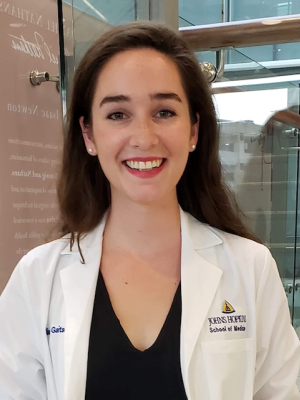
Multiple Sclerosis, Neuroimmunology, Molecular biomarkers
B.S., Yale University, 2019
M.D., Johns Hopkins University School of Medicine (In progress)
Hallie’s introduction to the world of scientific research began at the Fermi National Accelerator Laboratory in her hometown of Batavia, Illinois. As a high school student, she worked for the Dark Energy Survey identifying strong gravitational lensing candidates in images taken by the Dark Energy Camera through visual and computer analysis. This extraordinary experience sparked her interest in pursuing a career in science. Hallie attended Yale College, graduating in 2019 with a B.S. in Molecular, Cellular, and Developmental Biology with Distinction in the Major. During her undergraduate years, she worked as a research assistant in the lab of Dr. Amy Arnsten at the Yale School of Medicine, where she investigated pharmacologic interventions to treat negative symptoms of schizophrenia using rat models. In the summer of 2016, she was selected to participate in a Research Experience for Undergraduates at the University of Chicago Conte Center for Computational Neuropsychiatric Genomics where she used computer modeling to uncover hidden genetic and environmental correlations between traditionally distinct disease phenotypes. In the summer of 2017, she won a Thouron Scholarship to study in the Pembroke-King’s Programme at the University of Cambridge, during which time she completed a research supervision with Prof. Raymond Bujdoso focusing on the pathogenesis of proteinopathies and prion-related diseases. Her senior thesis at Yale was the culmination of three years of work in the lab of Dr. Erol Fikrig at the Yale School of Medicine investigating the role of the A. aegypti mosquito vector in Zika virus transmission, infection, and pathogenesis.
Hallie joined the Johns Hopkins School of Medicine MSTP in 2019 and has since completed her first two years of medical school. In 2021, she was awarded a Gates-Cambridge Scholarship. As an NIH Gates Cambridge Scholar, Hallie will be undertaking a Ph.D. in Clinical Neurosciences. She aims to draw upon her experiences in wet lab and computational research to complete an interdisciplinary, co-mentored research project in the field of neuroimmunology and, specifically, multiple sclerosis (MS). MS affects millions of people worldwide and often has debilitating outcomes ranging from disrupted sensation and loss of ambulation to cognitive dysfunction and psychiatric problems. Hallie’s project will focus on identifying molecular biomarkers for remyelination using methylation patterns in cell-free DNA released from glial progenitor cells. Hallie hopes that her work will contribute to a greater understanding of this complex disease and provide the ability to quantify the level of myelin regeneration in the brain and spinal cord during clinical trials of remyelinating therapies.
As a future physician-scientist, Hallie aims to devote her career to investigating the processes that govern disease etiology and pathogenesis and applying this knowledge to patient care. After completion of her doctoral training, she plans to finish medical school and then apply to research-focused residency programs in either neurology or neurosurgery. Her goal is to work at an academic medical center dividing her time between clinical work, conducting translational research, and teaching
Outside of the lab, Hallie enjoys reading, writing, playing viola, watching movies, running, and traveling. Her remedies for tough days include drinking plenty of tea (English Breakfast or Earl Grey), diving into a good book, wandering an art museum, listening to Bach’s violin sonatas & partitas, hanging out with her cat, watching a murder mystery (preferably Agatha Christie), and spending as much time as possible among trees.
Dr. Daniel Reich (NINDS) and
Prof. Robin Franklin (Cambridge)


